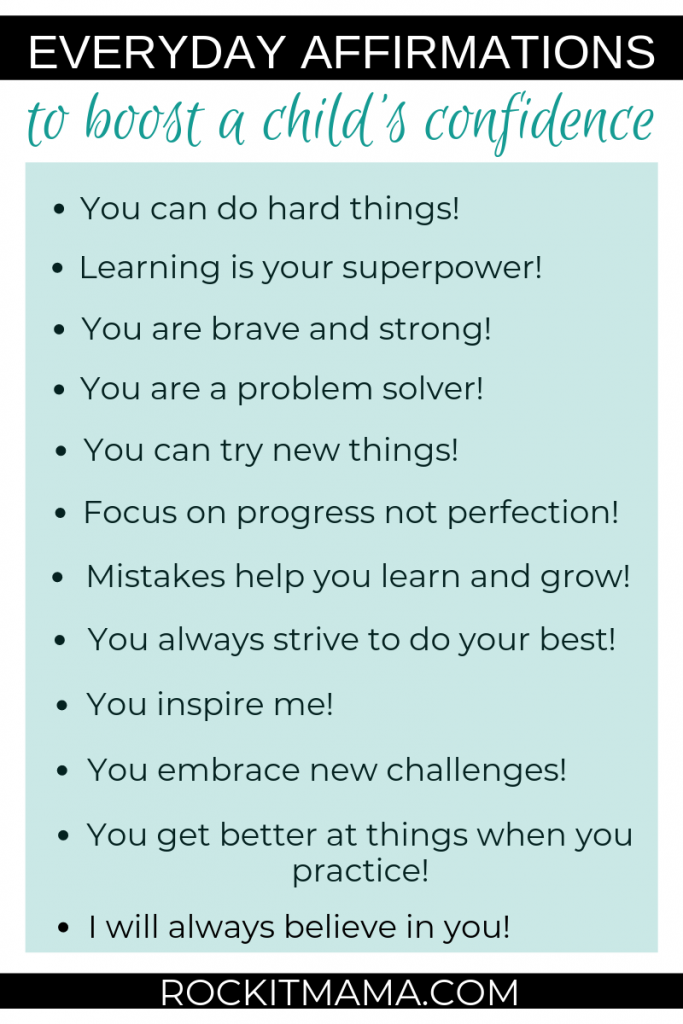“I can’t! I can’t!” he shouts as he tries to write the letter F. I can see tears of disappointment welling in his eyes. He puts the marker to the paper again, but for a second time isn’t happy with the product. My son is learning to write his name, and it has proven to be a learning experience for both of us. The word “can’t” makes me cringe.
I begin to question why he’s being so hard on himself. Do I praise him enough? Does he feel inadequate? Like any negative feeling my child experiences, I want to solve it immediately. However, thats not how it works.

Self-confidence is learned and developed over time through small achievements and a realistic perception of skills and abilities. It’s an essential behavior to cultivate in our kids, and subsequently set them up for their happiest lives.
By teaching our children to believe in themselves, we set them up for success. We can start with words of encouragement, but self esteem can be instilled in a variety of ways, big and small. Here are a few small (but critical!) steps for raising confident kids.
Use Words of Encouragement or Affirmations
Affirmations work for kids and adults alike. We all begin to believe what people tell us about ourselves. Feel free to reference the guide below for a list of everyday affirmations to boost a child’s confidence.

Choose Your Praises Wisely
I am all about using affirmations in any form, but its important to note that using affirmations that include born with traits such as “you’re really smart! or “you’re so beautiful!” sends the message that we only value traits that kids are born with (attractive, smart, etc) and doesn’t convey the notion that anything can be accomplished with perseverance, hard work and dedication.
Praising an accomplishment (and acknowledging the work it took complete it) establishes the fact that it was their hard work and practice that propelled them to achieve their goal, and that by setting goals we can push ourselves further. It’s also good to remember that confidence is gained in the process of goal actualization.
Examples:
Instead of “You’re really smart!”
- “I’m so proud of you for practicing writing the letter F and working so hard to write your name!”
- “Your strength and determination lifted you to learn to write your name! Your hard work really paid off!”
- “I love how much effort and energy you put into learning to write the letter F!”
In addition, throwing out too much praise can inundate your child’s ego, and could potentially minimize the value of the praise. If we reinforce every small deed our kids carry out, the praise will become less meaningful and thus, less impactful. Save big praises for accomplishments and achievements.
Step back and Let them Build Resilience
Remember the first paragraph of this post when I felt the need to eliminate my son’s problem and cancel the name-writing activity altogether so as to prevent him from feeling incapable? I feel that urge all the time. But by allowing kids to experience hardship or discomfort, we give them the opportunity to create solutions to solve their problems. These problem solving skills will be vital in all facets of their lives including our ever so important relationships, and will come in handy when they face the inevitable obstacles life will throw at them.
When we reinforce a child’s resilience, they learn to bounce back after a perceived failure. Step back and let them come up with their own plan for overcoming obstacles, rather than mow them down.
Model Self Love and Positive Talk
Have you ever caught yourself in a moment of negative self talk? I have. I’ve thrown out the phrases “I’m so stupid,” or “I look awful today,” in front of my kids not realizing the weight or impact of those words. It is true that kids are sponges, and if we model negative behaviors, they will too. Try to eliminate the negative self talk for yourself (it impacts parents too!) or at least attempt to ban it when in the company of little ones. Confident mommies and daddies raise confident kids. Lead by example!
Examples:
Instead of “Today sucked.”
- “I’ve had a tough day, but tomorrow will be better. I can feel it.”
- “Today may have not have been the best, but there were a lot of small positives, and I’m choosing to focus on those.”
- “I will bounce back tomorrow.”
Let Them Take Healthy Risks
A healthy risk is defined as a behavior in which the positive reward outweighs the harm in a given situation. Much like building resilience, when kids engage in healthy risk taking behaviors the outcome is worth the parental internal struggle. Risk-taking behavior enables a child to build confidence and strengthens decision making skills. It’s a positive tool for discovery, perception and developing a child’s personal identity. Being able to assess the risk in any situation is a crucial life skill and is important in helping children make good choices.
Examples of Healthy Risk Taking Behaviors:
- Getting up on a stage and singing a song
- Asking a stranger to be their friend
- Paying for their treat at the ice cream shop
- Helping measure ingredients in the kitchen
Try this…
Every morning I allow my son to be my barista. He fills my mug with water, pushes the buttons on the coffee maker, and adds my sugar and cream. Sometimes it ends with a spill or a coffee that is slightly too sweet (risk) but it has become a morning task and he loves it.
In the process of making my coffee, he’s mastering skills and learning a recipe which makes him feel important and needed. Little did I know, I’d been allowing my son to engage in a simple healthy risk behavior, and it’s been a small step for building his confidence.
We hope through this article you’ve discovered new ways to boost your child’s confidence. If you’d like to read more about child development, see 5 Simple Tips for Taming Tantrums








